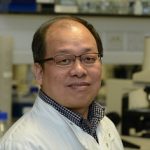The funding supports the seven following projects which will start in 2021:
 Dr Laura Woods, London School of Hygiene & Tropical Medicine
Dr Laura Woods, London School of Hygiene & Tropical Medicine
Dr Woods’ project extends her previous PCRF-funded pilot study, which showed it’s possible to use artificial intelligence techniques to identify patients at high risk of developing pancreatic cancer from information reported by patients to their GPs. This new project will refine the modelling tool using more patient records and up-to-date information. She will then estimate how well the tool would work in real life and how much it would cost the NHS to implement it.
 Professor Jason Carroll, University of Cambridge
Professor Jason Carroll, University of Cambridge
Professor Carroll has developed a new technique that allows him to ‘map’ protein interactions within a cancer tumour and identify possible proteins that could be a target for new treatments. He plans to apply this technique to pancreatic cancer tumours and use the resulting map to identify potential drug targets among the proteins. He’s particularly interested in mapping proteins called ‘transcription factors’ which switch genes on.
 Professor Len Seymour, University of Oxford
Professor Len Seymour, University of Oxford
Professor Seymour’s project aims to develop a virus that will specifically infect and break down pancreatic cancer cells and activate the immune system to help kill the cancer. Immunotherapy has made slow progress to date in pancreatic cancer, but Prof Seymour’s approach unusually targets both the tumour itself and the thick protective coating (the stroma) which surrounds the tumour. He hopes that this potential treatment could ultimately be delivered intravenously, which would benefit patients whose cancer has already spread to lymph nodes and other organs beyond the pancreas.
 Dr Giulia Biffi, University of Cambridge
Dr Giulia Biffi, University of Cambridge
Dr Biffi’s research targets non-cancerous cells that make up to 90% of each pancreatic cancer tumour. Some of these cells, called fibroblasts, help the cancer to grow and be resistant to chemotherapy. Dr Biffi’s new project aims to determine the different ways that various groups of fibroblasts contribute to the growth of pancreatic cancer. She will also look for ways to block them in order to potentially develop more effective combination treatments
 Professor Hemant Kocher, Barts Cancer Institute, Queen Mary University of London
Professor Hemant Kocher, Barts Cancer Institute, Queen Mary University of London
The thick scar-like tissue coating pancreatic tumours which prevents chemotherapy from working well is formed by specialised cells called pancreatic stellate cells (PSCs). Healthy PSCs store vitamin A, but in pancreatic cancer, PSCs lose their vitamin A stores and start laying down scar tissue. Prof Kocher has found that replenishing vitamin A stores in these cells can make them change back to normal, enabling chemotherapy to work better. This project will investigate how vitamin A affects the ‘genetic machinery’ of PSCs to enable this beneficial change.
 Professor John Marshall, Barts Cancer Institute, Queen Mary University of London
Professor John Marshall, Barts Cancer Institute, Queen Mary University of London
Professor Marshall’s previous PRCF-funded research showed that the molecule alpha-v beta-6 (αvβ6), which is abundant in around 80% of pancreatic cancers, drives the spread of the cancer to other organs. This new project will examine how αvβ6 causes the cancer to spread and will test two different types of drugs that he has been developing to stop αvβ6 working, and determine when and how best they could potentially be used for patients.
 Professor Yaohe Wang, Barts Cancer Institute, Queen Mary University of London
Professor Yaohe Wang, Barts Cancer Institute, Queen Mary University of London
In previous PCRF-funded research Professor Wang successfully modified a virus that was shown to be effective in killing pancreatic cancer cells in laboratory tests. But we now know that the cancer has many different ways to evade treatment and become resistant to ‘virotherapy’. Professor Wang is using the latest knowledge to design a new virotherapy that targets pancreatic cancer’s multiple resistance mechanisms at the same time, to both kill the cells and prevent them from returning.
